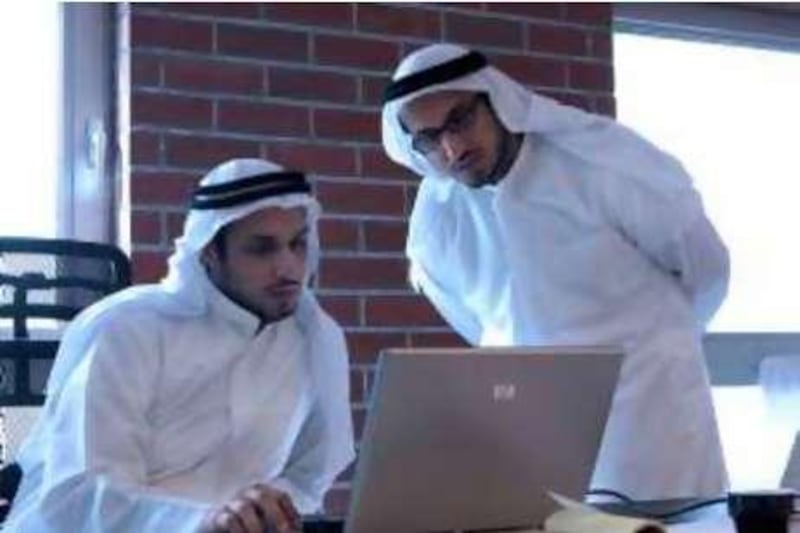At most magazines, being two articles short on closing day would be a cause for frenzied panic - of strained shouting and sweating and swearing. At the Dubai-based, bimonthly lifestyle magazine Brownbook, nobody bats an eyelid (except for this reporter, whose pulse races sympathetically).
"Yes, some pieces have been delayed," explains Rashid bin Shabib, the magazine's editor-in-chief. "It's OK, it's nothing. We've done this so many times, and we've passed our deadline so many times, and it's always OK." His brother, Ahmed, the magazine's advertising director, nods in quiet agreement.
They are sitting at a table on the upper section of the magazine's loft office in Media City. It looks like the set of a commercial for Apple computers, or designer furniture, or a lifestyle that involves both. The walls are mostly barren, there's a converted warehouse motif afoot, each brother has a MacBook Air, the bookshelves are full of issues of Monocle, Dwell and Wallpaper and most of the furniture is reproduced mid-century modern stuff from Vitra. There is a Barack Obama sticker on the desk. "We're big time fans," says Rashid. "He's so cool."
Brownbook has only been in this office for a month. Before that, they were in another DMC building. Before that, they worked out of an actual warehouse in Al Quoz. "Remember the warehouse?" Rashid asks the office. "There were birds living there, and insects."
As of last year, a warehouse office was all Brownbook could afford. The magazine started with help from the Mohammed bin Rashid Foundation, but went quickly into debt. "Each issue cost us about Dh60,000 to produce," says Rashid, laying out the magazine's nine issues on the floor. "And just look at the first issue. Look how disgusting we were. Look at the pixellation and the destructive printing. We had to sell our pages for nothing because our circulation was so low, maybe 1,000 people."
It was not particularly surprising that the magazine got off to a slow start. It began as a flyer-like offshoot of brownbag.ae, a website the brothers started after graduating from Boston University ("Every time I think of Boston, I get homesick," says Rashid. "We're New Englanders," chimes Ahmed.) The site sells, among other things: iPods, espresso machines, magazines, condoms, DVDs, cereal and painkillers - and promises delivery to any location in Dubai within one hour after an order is placed (Hello, Brownbag? Give me an 8 gigabyte green iPod nano, National Treasure 2: Book of Secrets, two packs of Dunhill Lights, the newest MAD magazine, a three-pack of Durex Pleasure Max Warming and the Nespresso Es100 with three litre steam nozzle. Stat!)
According to Rashid, Brownbag eventually managed to break even. More importantly (and more lucratively), it gave the brothers and their corporate backers a list of prospective Brownbook subscribers - young consumers interested in what Ahmed calls "the new hip and cool agenda".
"Our problem," says Rashid, "was that our early issues had nothing to do with the Middle East or the Emirates. We had the right attitude - hip and cool - but the wrong subjects. So we decided to start focusing on the region, and people said: 'Yes, yes, feed us this content'. And we just listen to the kids now."
Today, Brownbook circulates 25,000 copies around the globe, and its pages are filled with high-end advertisements. The Shabib brothers have just launched an online newspaper called Arab Eastern. And they are planning a 300-page photo biography of their grandfather, Mohammed Saeed al Mulla.
Rashid announces a five-day deadline extension and eagerly starts showing me the best of the photographs.
"This is my grandfather, and this is Sheikh Rashid, who was Sheikh Mohammed's father, and this is Gamal Abdel Nasser, who used to be the president of Egypt, and I think this is Anwar Sadat and some Abu Dhabi guys. This is when he was starting a company, I don't know if you've heard about it, called Etisalat. This was in the Seventies, so it looks very retro and cool, like something out of Lost."






